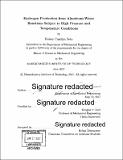Hydrogen production from aluminum-water reactions subject to high pressure and temperature conditions
Author(s)
Seto, Kelsey C
DownloadFull printable version (8.519Mb)
Other Contributors
Massachusetts Institute of Technology. Department of Mechanical Engineering.
Advisor
Douglas P. Hart.
Terms of use
Metadata
Show full item recordAbstract
Aluminum fuel has become an attractive form of energy storage in recent years as it is both a highly abundant and extremely energy dense material. Research has discovered methods of treating aluminum with liquid metal, enabling the aluminum to produce large amounts of hydrogen when oxidized by liquid water. When this fuel reacts with water, it produces hydrogen, heat, and aluminum hydroxide (Al(OH) 3 ). Although this aluminum fuel has already been integrated into an effective mobile hydrogen production source for hydrogen fuel cells, the system size and weight is restricted by the amount of water that is required to react the aluminum. The less water that needs to be carried on board, the better, and the only way to decrease the amount of water that is required to produce hydrogen through aluminum-water reactions is to alter the chemistry of the reaction. This thesis investigates the possibility of manipulating the chemistry of these reactions at high pressures and temperatures to produce aluminum oxyhydroxide (AlOOH) or aluminum oxide (Al203 ), both of which are byproducts of aluminum-water reactions which consume less water than the Al(OH) 3 reaction for the amount of hydrogen produced. A MATLAB simulation was constructed to predict the favorability of each byproduct by analyzing the Gibbs free energy of the reactions as a function of pressure and temperature. This simulation revealed that A100H becomes favorable over Al(OH) 3 at 142.38°C and 387kPa and A120 3 becomes favorable over A100H at 174.21°C and 889kPa in a system with a 200ml volume in which 5g of fuel is reacted. Pressurized tests were also carried out and the experiment results showed that A1OOH was produced from these aluminum-water reactions at 181°C and 1035kPa, proving that it is possible to manipulate these reactions to improve the performance of aluminum fuel as a hydrogen source.
Description
Thesis: S.M., Massachusetts Institute of Technology, Department of Mechanical Engineering, 2017. Cataloged from PDF version of thesis. Includes bibliographical references (pages 75-77).
Date issued
2017Department
Massachusetts Institute of Technology. Department of Mechanical EngineeringPublisher
Massachusetts Institute of Technology
Keywords
Mechanical Engineering.